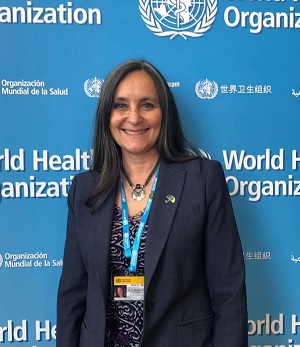WONCA-WHO Liaison Annual report
 The following is a short version of this report to be published in the 2020 WONCA Annual report. WHO liaison person, Viviana Martinez-Bianchi writes:
The following is a short version of this report to be published in the 2020 WONCA Annual report. WHO liaison person, Viviana Martinez-Bianchi writes:
WONCA Statement of support for the World Health Organization
In June 2020, WONCA released the following statement (endorsed by WONCA Executive) outlining its support for WHO in the current coronavirus pandemic:
The COVID-19 Pandemic constitutes a serious public health crisis, affecting all countries in the world. WONCA recognizes the World Health Organization's critical and leading role during the pandemic, working across six regions, delivering essential equipment, providing technical guidance and education, and mobilizing resources while emphasizing health for all.
WONCA will continue to partner with WHO in its efforts to improve health through providing comprehensive care for people of all ages and encouraging Universal Health Coverage through strong Primary Health Care; and will continue to collaborate in technical papers, educational resources, and policy support.
COVID-19: Health Services Learning Hub
WHO has invited WONCA to be a member of the COVID-19: Health Services Learning Hub. The goal of the hub is to drive activated learning to maintain essential health services in the context of the COVID-19 pandemic - and transform health services for the future. WONCA will coordinate with member organizations how best to participate in this endeavour, and who the Member Organisation focal points will be to collaborate.
WHO World Health Assembly
WONCA participated in WHA73 on 22 May 2020 virtually, using video conference technology. The meetings had an emphasis on the COVID 19 Pandemic, a reduced agenda to fit into two days.
The following are the recommendations from WONCA’s written statement to the WHA.
WONCA recommends:
1. Appropriate funding for PHC, and an increase in the numbers of family doctors and other members of the healthcare team trained so that every country is prepared to manage the pandemic.
2. Ensure access to care, drugs & diagnostics availability for COVID-19 and non-COVID-19 conditions.
3. Family doctors and other PHC professionals are central to health emergency risk management, preparedness and communication locally & nationally. To ensure their protection, PPE must be provided to all.
4. Rural migrants, inner city dwellers, people living in multigenerational family units, refugees and other vulnerable populations are often the worst affected; adequate consideration should be given to their socioeconomic and health needs.
5. More widespread testing to better understand the true prevalence of disease in the community
6. Breaking silos and providing innovation in data and technology with data integration, allowing much improved health information exchange between hospitals, PHC, labs, practices, and health departments.
7. PHC needs to be included in Humanitarian Aid and Global Health planning and budgeting. Without PHC the outcomes of this and future pandemics and disasters will be worse.
Success will come from investing in the frontline with well-resourced PHC teams working at the community level
WHO teleconferences
Several working teleconferences held. Participants have included for WHO: Ed Kelley, Shannon Barkley, John Fogarty, WHO Division of UHC and Life Course
For WONCA: Donald Li, Anna Stavdal, Shabir Moosa, Monica Burns, Viviana Martinez-Bianchi, Garth Manning.
Much of the discussion revolved around COVID and how WONCA can help with dissemination of information, and members providing access to care. Action points included:
• identify mechanisms for dissemination of WHO guidance through WONCA networks
• identify opportunities for WONCA’s support on evidence review or guideline review
• opportunities for WONCA to participate in forthcoming learning platforms for maintaining essential health services
• identify WONCA activities where WHO can support, e.g. webinars
• identify a list of WHO resource people who could join the WONCA webinars panel (this is ongoing, with WHO representation in our WONCA Webinars)
WHO material on COVID 19.
> Great informational material
WONCA received an invitation for a WHO ad-hoc consultation on managing the COVID-19 infodemic. The aim of this technical consultation was to develop an infodemic response framework to guide targeted interventions to promote dissemination of reliable information about COVID-19, and reduce misinformation, rumours and myths about COVID-19. I attended on behalf of WONCA. The presentations are included in this
link
> See full report